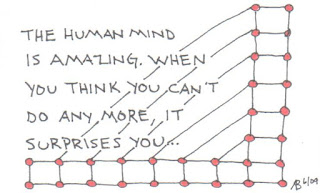 When was the last time you really challenged your mind -- focused on something so intensely that it actually mentally and physically exhausted you? You know when you truly focus because the effort transcends time. You look at the clock and hours have passed without you even knowing, and it's a great feeling.
When was the last time you really challenged your mind -- focused on something so intensely that it actually mentally and physically exhausted you? You know when you truly focus because the effort transcends time. You look at the clock and hours have passed without you even knowing, and it's a great feeling.I've always challenged my mind with the creative process. For years I have constructed installations, or what some call paintings. I've gotten to the point where I build the installations from scratch. I find nothing more satisfying than watching something my mind conceived become a physical reality.
Lately I've poured my mental stimulation into this blog, and in the course I have developed a new outlet for the desire to exercise the creative process. All of the pictures associated with the posts on this blog are drawn by me. Those pictures, which usually start out as a simple thought, ultimately shape the words you are reading. So, I'm creating "art" and practicing my writing.
At the end of the day, I don't care who reads my blog, or likes my art work (my art is an acquired taste) -- although, it's nice if folks do like the product. I draw the pictures and write the posts for myself as a way to exercise and challenge my mind. Much like with physical exercise, this blog has become mental exercise for me -- a way to work out my mind.
I'm a firm believer in the school of thought that your mind is perishable, if you don't use it (challenge it), you'll lose it. Whether you exercise your mind with the creative process, stimulate it with a good book, play or listen to music, work a crossword puzzle, or any other way you can find, the key is to invigorate your thought process. Push your mental faculties. Continue to challenge your mind and it will continue to surprise you with what it is capable of accomplishing.
How do you challenge your mind?
Related Random Thoughts












